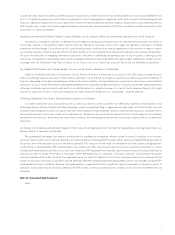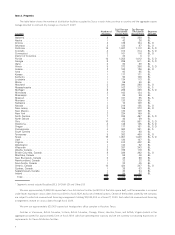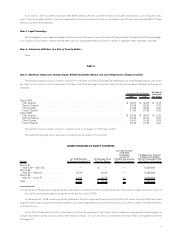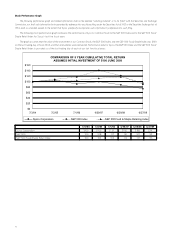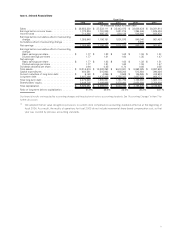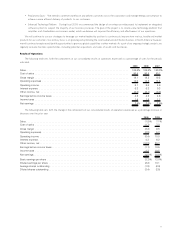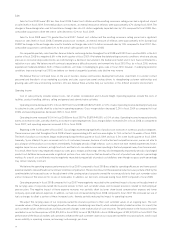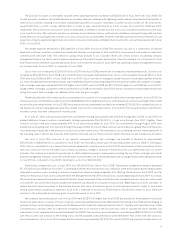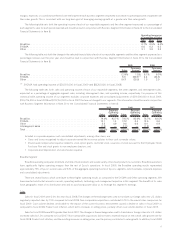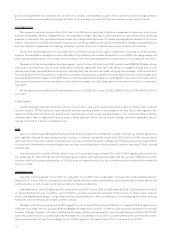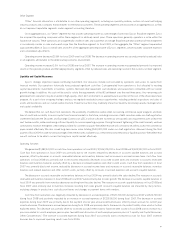Sysco 2009 Annual Report Download - page 35
Download and view the complete annual report
Please find page 35 of the 2009 Sysco annual report below. You can navigate through the pages in the report by either clicking on the pages listed below, or by using the keyword search tool below to find specific information within the annual report.The provision for losses on receivables included within operating expenses increased by $42,454,000 in fiscal 2009 over fiscal 2008. The
current economic conditions and related decrease in consumer demand combined with tightening credit markets have impacted the liquidity of
some of our customers, resulting in an increase in delinquent payments on accounts receivable. Customer accounts written off, net of recoveries,
were $71,877,000, or 0.20% of sales, $32,367,000, or 0.09% of sales, and $26,010,000 or 0.07% of sales, for fiscal 2009, 2008 and 2007,
respectively.The increase in our provision for losses on receivables is related to customer accounts across our customer base without concentration
in any specific location. We continue to monitor our customer account balances and our credit policies and believe continued strong credit practices
will be necessary to avoid significant increases in our provision for losses on receivables. However, if the difficult economic environment persists, we
expect to continue to experience higher levels of provision for losses on receivables and higher levels of write-offs, such as those experienced in fiscal
2009, in fiscal 2010.
Pay-related expenses decreased by $192,086,000 in fiscal 2009 from fiscal 2008. The reduction was due to a combination of reduced
headcount and lower incentive compensation. Headcount declines occurred due to both productivity improvements and workforce reductions
commensurate with lower sales. The criteria for paying annual bonuses to our corporate officers and certain portions of operating company
management bonuses are tied to overall company performance. The overall company performance criteria for payment of such bonuses for fiscal
2009 were not met; therefore corporate executive officers will not receive bonuses for fiscal 2009 and operating company management bonuses
are at lower levels for fiscal 2009 as compared to fiscal 2008.
Sysco’s fuel costs increased by $33,154,000 in fiscal 2009 over fiscal 2008 primarily due to increased contracted diesel prices. Our fuel costs
increased by $34,023,000 in fiscal 2008 over fiscal 2007 due to increased market diesel prices. Sysco’s costs per gallon increased 18.6% in fiscal
2009 over fiscal 2008 and 18.7% in fiscal 2008 over fiscal 2007. Sysco’s activities to manage increased fuel costs include reducing miles driven by
our trucks through improved routing techniques, improving fleet utilization by adjusting idling time and maximum speeds and using fuel surcharges.
Fuel surcharges were approximately $5,000,000 higher in fiscal 2009 over fiscal 2008 and $27,000,000 higher in fiscal 2008 than in fiscal 2007.
Usage of these surcharges was greater in the second half of fiscal 2008 and first half of fiscal 2009, due to sustained, increased market diesel prices
during that period. Fuel surcharges are reflected within sales and gross margins.
We periodically enter into forward purchase commitments for a portion of our projected monthly diesel fuel requirements. In fiscal 2009, the
forward purchase commitments resulted in an estimated $68,000,000 of additional fuel costs as the fixed price contracts were higher than market
prices for the contracted volumes. In fiscal 2008, the forward purchase commitments resulted in an estimated $21,000,000 of avoided fuel costs as
the fixed price contracts were generally lower than market prices for the contracted volumes. In fiscal 2007, the forward purchase commitments
resulted in prices that were comparable to market prices.
As of June 27, 2009, we had forward diesel fuel commitments totaling approximately $64,000,000 through March 2010. In July 2009, we
entered additional forward purchase commitments totaling approximately $16,000,000 at a fixed price through June 2010. Together, these
contracts will lock in the price of approximately 40% of our fuel purchase needs for fiscal 2010. Our commitments through August 2009 were
entered into at prevailing rates from mid-July through mid-August 2008. As a result, these contracts are at fixed prices greater than both the prices
incurred during same periods in the previous fiscal year and current market prices. The remainder of our outstanding contracts were entered into at
the prevailing rates in March, April and July 2009 and thus the fixed price on these contracts reflects the lower current market price for diesel.
Fuel costs in fiscal 2010, exclusive of any amounts recovered through fuel surcharges, are expected to decrease by approximately
$50,000,000 to $80,000,000 as compared to fiscal 2009. Our estimate is based upon the prevailing market prices for diesel in mid-August
2009, the cost committed to in our forward fuel purchase agreements currently in place for fiscal 2010 and estimates of fuel consumption. Actual
fuel costs could vary from our estimates if any of these assumptions change, in particular if future fuel prices vary significantly from our current
estimates. We continue to evaluate all opportunities to offset potential increases in fuel expense, including the use of fuel surcharges and overall
expense management. However, consistent with the lower current market price for diesel, we expect fuel surcharge revenue to be significantly lower
in fiscal 2010 as compared to fiscal 2009, declining by as much as $60,000,000.
Share-based compensation cost in fiscal 2009 was $24,620,000 less than in fiscal 2008. Share-based compensation expense decreased
$17,335,000 in fiscal 2008 from fiscal 2007. Contributing to the decrease in both years was a reduction in the level of option grants being awarded
compared to previous years, resulting in reduced compensation expenses being recognized. Also affecting the decrease in fiscal 2009 was the
removal of the previous stock award component from the Management Incentive Plan annual bonus awards beginning with fiscal 2009. As a result,
the share-based compensation expense related to the stock award component of the incentive bonuses recorded in previous years was not incurred
in fiscal 2009, and overall share-based compensation expense was reduced as compared to the prior year. Beginning in fiscal 2010, we expect to
replace the stock award component of the incentive bonuses with annual discretionary grants of restricted equity awards subject to time-based
vesting. Share-based compensation expense in fiscal 2010 is expected to increase by $5,000,000 to $15,000,000 relative to fiscal 2009 due
primarily to the anticipated discretionary grant of restricted awards in fiscal 2010.
Net company-sponsored pension costs in fiscal 2009 were $22,877,000 higher than fiscal 2008, due primarily to the recognition of actuarial
losses from lower returns on assets of Sysco’s company-sponsored qualified pension plan (Retirement Plan) during fiscal 2008 and the merging of
participants from a multi-employer pension plan the Retirement Plan (see Multi-Employer Pension Plans at “Liquidity and Capital Resources, Other
Considerations”), partially offset by a decrease in expense due to an increase in the discount rates used to calculate the plan’s liabilities and
amendments to our Supplemental Executive Retirement Plan (SERP). Net company-sponsored pension costs decreased $8,754,000 in fiscal 2008
over the prior year, due primarily to the funding status and the projected asset performance of the Retirement Plan at that time. Net company-
sponsored pension costs in fiscal 2010 are expected to increase by approximately $37,000,000 over fiscal 2009 due primarily to lower returns on
15




